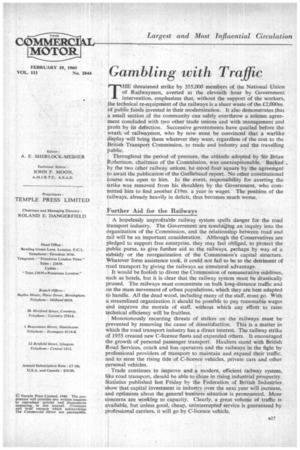Gambling with Traffic
Page 31

If you've noticed an error in this article please click here to report it so we can fix it.
THE threatened strike by 355,000 members of the National Union of Railwaymen, averted at the eleventh hour by Government intervention, emphasizes that, without the support of the workers, the technical re-equipment of the railways is a sheer waste of the £2,000m. of public funds invested in their modernization. It also demonstrates that a small section of the community can safely overthrow a solemn agreement concluded with two other trade unions and with management and profit by its defection. Successive governments have quailed before the wrath of railwaymen, who by now must be convinced that a warlike display will bring them whatever they want, regardless of the cost to the British Transport Commission, to trade and industry and the travelling public.
Throughout the period of pressure, the attitude adopted by Sir Brian Robertson, chairman of the Commission, was unexceptionable. Backed. by the two other railway unions, he stood four square by the agreem,pnt to await the publication of the Guillebaud report. No other constitutional course was open to him. In the event, responsibility for averting the strike was removed from his shoulders by the Government, who committed him to find another £19m. a year in wages.' The-position of the railways, already heavily in deficit, thus becomes much worse.
Further Aid for the Railways
A hopelessly unprofitable railway system spells danger for the road transport industry. The Government are conducting an inquiry into the organization of the Commission, and the relationship between road and rail will be an important consideration. Although the Conservatives are pledged to support free enterprise, they may feel obliged, to protect the public purse, to give further aid to the railways, perhaps by way of a subsidy or the reorganization of the Commission's capital structure. Whatever form assistance took, it could not fail to be to the detriment of road transport by giving the railways an unnatural advantage.
It would be foolish to divest the Commission of remunerative sidelines, such as hotels, but it is clear that the railway system must be drastically pruned. The railways must concentrate on bulk long-distance traffic and on the mass movement of urban populations, which they are best adapted to handle. All the dead wood, including many of the staff, must go. With a streamlined organization it should be possible to pay reasonable wages and improve the morale of staff, without which any effort to raise technical efficiency will be fruitless.
Monotonously recurring threats of strikes on the railways must be prevented by removing the cause of dissatisfaction. This is a matter in which the road transport industry has a direct interest. The railway strike of 1955 created new C-licence fleets and expanded others. It encouraged the growth of personal passenger transport. Hauliers stand with British Road Services, coach and bus operators and the railways in the fight by professional providers of transport to maintain and expand their traffic, and to stem the rising tide of C-licence vehicles, private cars and other personal vehicles.
Trade continues to improve and a modern, efficient railway system, like road transport, should be able to share in rising industrial prosperity. Statistics published last Friday by the Federation of British Industries show that capital investment in industry over the next year will increase, and optimism about the general business situation is pronounced. More concerns are working to capacity. Clearly, a great volume of traffic is available, but unless good, cheap, uninterrupted service is guaranteed by professional carriers, it will go by C-licence vehicle.








































































































